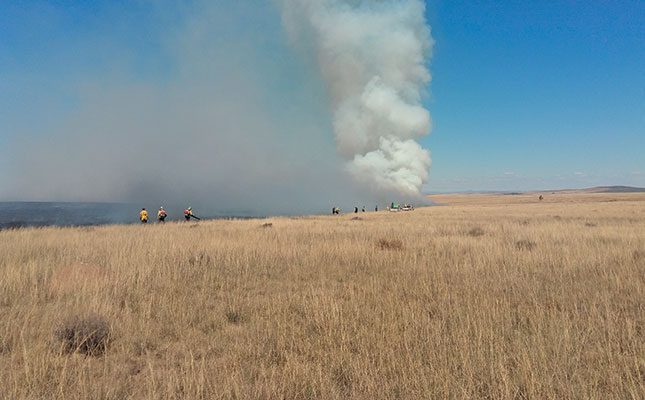
The lack of maintenance on these structures has been responsible for runaway fires that have caused significant damage to farms.
Janneman Robberts, a grain and livestock farmer in Ermelo, Mpumalanga, told Farmer’s Weekly that there have been two incidents in the past two years in which faulty lines had created sparks that set his veld alight.
“Fifty hectares and 100ha of maize [fields] respectively [were] burnt just before it could be harvested,” said Robberts.
He said that transformers from Eskom poles would just fall to the ground after not being properly secured and resecured over time.
“Farmworkers have been [electrocuted], but our pleas to Eskom to maintain their infrastructure fall on deaf ears.
“Any claims for compensation go unheard.”
Furthermore, when fires break out, farmers, workers and communities had to risk their lives to put them out.
Robert Davel, CEO of Mpumalanga Agriculture, noted that farmers were having to pay ‘double’ tax since repairing infrastructure on government’s behalf.
“Agriculture in Mpumalanga contributes R40 billion to the provincial economy and provides 80 000 jobs. It is therefore baffling that government does not do more to create an environment in which the sector can remain sustainable, or even flourish. Instead, society has to provide their own services, which comes at an extra cost and is not sustainable.”
Cobus van Zyl, chairperson of Agri SA’s economic committee, confirmed that the situation was dire, and that he had also lost two cows that had burnt to death during a fire that broke out in December as a result of a faulty Eskom line.
“Unfortunately, Eskom just doesn’t have the money to service these lines and the bad news is that we have to make a plan ourselves.”
However, he said that the dire situation had a silver lining: it was speeding up the energy revolution.
“Lines are being privatised and in certain sections it is becoming possible to manage the infrastructure privately. We are moving towards small-scale immediate generation, and there are many more opportunities that are arising. Our electricity network will not look the same in 20 years.”
Robberts called on farmers to be helpful when Eskom technicians arrived on the farm to fix lines.
“Line inspectors are often treated badly […].
“But if we want maintenance, we must make fixing the lines a pleasant experience for the technicians.”












